|
Books Should Be Free Loyal Books Free Public Domain Audiobooks & eBook Downloads |
|
|
Books Should Be Free Loyal Books Free Public Domain Audiobooks & eBook Downloads |
|
Literature |
|---|
|
Book type:
Sort by:
View by:
|
By: Theodora Bosanquet (1880-1961) | |
|---|---|
 Henry James At Work
Henry James At Work
Bosanquet was secretary or amanuensis to James from 1907 to his death in 1916. She wrote this essay eight years after his death as part of the series Hogarth Essays by the Hogarth Press. It is a narrative of her experience of his methods, values, and life. - Summary by David Wales | |
By: Theodore Dreiser (1871-1945) | |
|---|---|
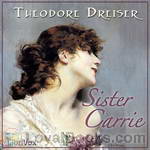 Sister Carrie
Sister Carrie
Published in 1900, Sister Carrie follows its protagonist, Carrie, as she resolutely makes her way through the bustling city of Chicago in the hope of achieving her ultimate goal of a securing a better and more glamorous life for herself. Effectively illustrating his reputation as one of America’s greatest naturalists, Dreiser deviates from the established norms and moral values present in the Victorian era, and instead focuses his attention on accurately portraying the basic instincts that influence human behavior... | |
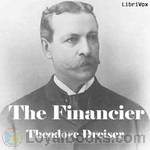 The Financier
The Financier
In Philadelphia, Frank Cowperwood, whose father is a banker, makes his first money by buying cheap soaps on the market and selling it back with profit to a grocer. Later, he gets a job in Henry Waterman & Company, and leaves it for Tighe & Company. He also marries an affluent widow, in spite of his young age. Over the years, he starts embezzling municipal funds. In 1871, the Great Chicago Fire redounds to a stock market crash, prompting him to be bankrupt and exposed. Although he attempts to browbeat his way out of being sentenced to jail by intimidating Mr Stener, politicians from the Republican Party use their influence to use him as a scapegoat for their own corrupt practices... | |
 Jennie Gerhardt
Jennie Gerhardt
This is a story of an innocent, caring, beautiful young girl from and extremely poor family who throughout her life is drawn into affairs with two different men from a much higher social class. How members of her family, the family of one of the wealthy men, and society in general react to her situation is the basis of this story. | |
By: Théophile Gautier (1811-1872) | |
|---|---|
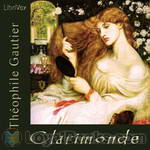 Clarimonde
Clarimonde
Original title “La Morte Amoreuse.” This is the story of a priest named Romauld, and his all-consuming love for the beautiful courtesan, Clarimonde. | |
 Romance of a Mummy and Egypt
Romance of a Mummy and Egypt
MANUAL OF SURGERY, OXFORD MEDICAL PUBLICATIONSBY ALEXIS THOMSON, F.R.C.S.Ed.PREFACE TO SIXTH EDITION Much has happened since this Manual was last revised, and many surgical lessons have been learned in the hard school of war. Some may yet have to be unlearned, and others have but little bearing on the problems presented to the civilian surgeon. Save in its broadest principles, the surgery of warfare is a thing apart from the general surgery of civil life, and the exhaustive literature now available on every aspect of it makes it unnecessary that it should receive detailed consideration in a manual for students... | |
By: Thomas A. Janvier (1849-1913) | |
|---|---|
 Uncle Of An Angel
Uncle Of An Angel
In what I have read so far this book appears to be a humorous character study on two levels. That between the uncle and niece and that of polite society in the 19th century. Anything can happen. I for one want to find out what will happen!! | |
By: Thomas Babington Macaulay (1800-1859) | |
|---|---|
 Life and Writings of Addison
Life and Writings of Addison
Joseph Addison was an English essayist, poet, playwright, and Whig politician. Today he is most famous for his contributions, with Richard Steele, to the "The Spectator" magazine. In this essay, Macaulay portrays the life and work of this quiet, compassionate man, who amidst the cut and thrust of bitter political and literary rivalries, was always a gentleman, loved by his friends and, in the person of the Spectator, by posterity, as well. | |
 Milton
Milton
John Milton was an English poet, classicist, and fearless advocate for civil liberty, who served the Commonwealth of England under Oliver Cromwell. He is best known for his epic poem "Paradise Lost" , a work of sublime imagery and hidden heresy. In this long essay, Macaulay combines literary criticism with political history, writing that to Milton, almost alone among his contemporaries, belonged "the glory of the battle which he fought for, the species of freedom which is the most valuable, and which was then the least understood, the freedom of the human mind." | |
By: Thomas Bailey Aldrich (1836-1907) | |
|---|---|
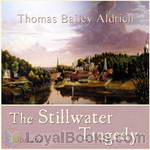 The Stillwater Tragedy
The Stillwater Tragedy
Thomas Bailey Aldrich was an American poet, novelist and editor. Of his many books of poetry and fiction, he may be best known for his semi-autobiographical novel, The Story of a Bad Boy and his collection of short stories, Majorie Daw and Other People. The Stillwater Tragedy which was published in 1880 is set in a small New England manufacturing town whose tranquility is disturbed first by the murder of one of its prominent citizens followed soon thereafter by a general strike of all the trades-unions. As the story develops, Richard Shackford, the murdered man’s nephew, finds himself inextricably caught up in both these events. | |
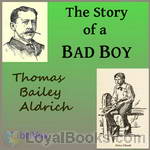 The Story of a Bad Boy
The Story of a Bad Boy
Thomas Bailey Aldrich was a child when his father moved to New Orleans from Portsmouth, New Hampshire. After 10 years, Aldrich was sent back to Portsmouth to prepare for college. This period of his life is partly described in his semi-autobiographical novel The Story of a Bad Boy (1870), in which "Tom Bailey" is the juvenile hero. Critics have said that this novel contains the first realistic depiction of childhood in American fiction and prepared the ground for Adventures of Huckleberry Finn. Aldrich went on to associate with many of the literati of his time in New York City, and was editor of the Atlantic Monthly in the 1880's... | |
By: Thomas Browne | |
|---|---|
 Religio Medici and Hydriotaphia
Religio Medici and Hydriotaphia
Religio Medici (The Religion of a Doctor) sets out Sir Thomas Browne's spiritual testament as well as being an early psychological self-portrait. In its day, the book was a European best-seller. It was published in 1643 by the newly-qualified physician, and its unorthodox views placed it swiftly upon the Papal Index Librorum Prohibitorum in 1645. Although predominantly concerned with Christian faith, the Religio also meanders into digressions upon alchemy, hermetic philosophy, astrology, and physiognomy... | |
By: Thomas Bulfinch | |
|---|---|
 The Legends of Charlemagne
The Legends of Charlemagne
Bulfinch (July 15, 1796 - May 27, 1867) explains the his work is "an attempt tell the stories of mythology in such a manner as to make them a source of amusement. We have endeavored to tell them correctly, according to the ancient authorities, so that when the reader finds them referred to he may not be at a loss to recognize the reference. Thus we hope to teach mythology not as a study, but as a relaxation from study; to give our work the charm of a story-book, yet by means of it to impart a knowledge of an important branch of education... | |
By: Thomas de Quincey (1785-1859) | |
|---|---|
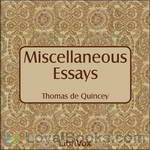 Miscellaneous Essays
Miscellaneous Essays
The Hunter Thompson of the 19th Century, de Quincey is best known for his Confessions of an English Opium Eater (an activity shared with his hero, Samuel Coleridge, much to Wordsworth’s dismay). However, de Quincey’s literary genius is best captured in his essays, and, according to Wikipedia: His immediate influence extended to Edgar Allan Poe, Fitz Hugh Ludlow and Charles Baudelaire, but even major 20th century writers such as Jorge Luis Borges admired and claimed to be partly influenced by his work. | |
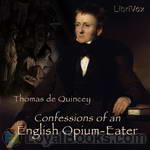 Confessions of an English Opium-Eater
Confessions of an English Opium-Eater
“Thou hast the keys of Paradise, O just, subtle, and mighty Opium!” Though apparently presenting the reader with a collage of poignant memories, temporal digressions and random anecdotes, the Confessions is a work of immense sophistication and certainly one of the most impressive and influential of all autobiographies. The work is of great appeal to the contemporary reader, displaying a nervous (postmodern?) self-awareness, a spiralling obsession with the enigmas of its own composition and significance... | |
By: Thomas Dixon, Jr. (1864-1946) | |
|---|---|
 Clansman, An Historical Romance of the Ku Klux Klan
Clansman, An Historical Romance of the Ku Klux Klan
The second book in a trilogy of the Reconstruction era - The Leopard's Spots (1902), The Clansman (1905), and The Traitor (1907), this novel was the basis for the 1915 silent movie classic, "The Birth Of A Nation". Within a fictional story, it records Dixon's understanding of the origins of the first Ku Klux Klan (his uncle was a Grand Titan during Dixon's childhood), recounting why white southerners' began staging vigilante responses to the savage personal insults, political injustices and social cruelties heaped upon them during Reconstruction... | |
By: Thomas Frost (1821-1908) | |
|---|---|
 In Kent with Charles Dickens
In Kent with Charles Dickens
By his own admission, Thomas Frost found it hard to make a living from his writing, and no doubt he used the name of Dickens in the title of this book to boost sales. Frost tells a good tale, and the book is not only of interest to enthusiasts of Dickens and the county of Kent.He includes some of Dickens’ own descriptions of locations, as well as regaling us with anecdotes about towns and villages which he visits, including an account of the last armed rising on British soil – the Battle of Bossenden Wood... | |
By: Thomas Hardy (1840-1928) | |
|---|---|
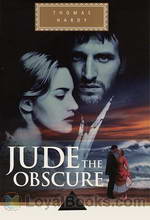 Jude the Obscure
Jude the Obscure
A young man from a poor, working-class background, passionate about education, who aspires to become a professor. His teacher, a respected role model who turns out to have feet of clay. An independent, free-spirited woman. Another who is scheming, selfish and flirtatious. Dominating their lives is the magnificent university town of Christminster. All these and a host of other colorful, memorable characters inhabit the pages of Thomas Hardy's monumental fourteenth novel published in 1895. Thomas Hardy's fame as a novelist rivals that of even Dickens in Victorian literature... | |
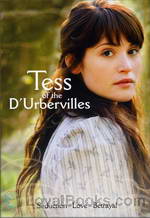 Tess of the d'Urbervilles
Tess of the d'Urbervilles
Her father compels her to visit the biggest mansion in the village to “claim kin” with the aristocratic d'Urberville family. She falls prey to the debauched son of the house and returns home to give birth in secret to an illegitimate baby who lives only for a few days. Determined to put her past behind her, she goes to work as a milkmaid in a faraway country farmhouse where she falls in love with a good and kind young man. Her conscience troubles her and she confesses the truth about herself in a letter which her beloved never receives... | |
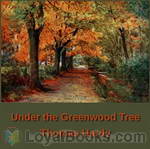 Under the Greenwood Tree
Under the Greenwood Tree
This novel is subtitled The Mellstock Quire, A Rural Painting of the Dutch School. The Quire is the group of musicians who accompany the hymns at the local church and we follow the fortunes of one member, Dick Dewy, who falls in love with the new school mistress, Fancy Day. Another element of the book is the battle between the traditional musicians of the Quire and the local vicar, Parson Maybold, who installs a church organ. This battle illustrates the developing technology being introduced in the Victorian era and its threat to traditional country ways... | |
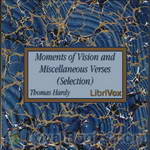 Moments of Vision
Moments of Vision
Hardy claimed poetry as his first love, and published collections until his death in 1928. Although not as well received by his contemporaries as his novels, Hardy’s poetry has been applauded considerably in recent years. Most of his poems deal with themes of disappointment in love and life, and mankind’s long struggle against indifference to human suffering. | |
 A Pair of Blue Eyes
A Pair of Blue Eyes
The book describes the love triangle between a young woman, Elfride Swancourt, and her two suitors from very different backgrounds. Stephen Smith is a socially inferior but ambitious young man who adores her and with whom she shares a country background. Henry Knight is the respectable, established, older man who represents London society. | |
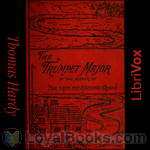 The Trumpet-Major
The Trumpet-Major
Our heroine, Anne Garland, lives quietly in a rural community deep in the English countryside. However, the arrival of several regiments preparing for an expected invasion brings colour and chaos to the county. A graceful and charming young woman, Anne is pursued by three suitors: John Loveday, the trumpet-major in a British regiment, honest and loyal; his brother Robert, a merchant seaman and womaniser, and Festus Derriman, the cowardly son of the local squire. Set at the time of the Napoleonic wars, this is the author’s only historical novel, and unusually for Hardy’s stories, most of the characters live happily ever after. | |
 Two on a Tower
Two on a Tower
The plot concerns two – literally starcrossed – lovers: Swithin St. Cleeve, a very young amateur astronomer, and Viviette Constantine, an unhappily married and abandoned woman 8 or 9 years his senior. Each night Swithin climbs the old tower of the title, in the grounds of the Constantine estate. Lady Constantine, whose husband has been absent some years on an extended hunting and exploring journey to Africa, joins the young man in his stargazing, and supports his astronomical ambitions by buying him equipment, though his dreams of scientific renown are disappointed.Their relationship then deepens and takes several twists and turns. | |
 Wessex Tales
Wessex Tales
Wessex Tales is a collection of six short stories written by Hardy in the 1880’s. If you’ve never read Hardy they’ll serve as a good introduction to his writing. Though not as comprehensive as his major works they do contain all the ingredients that make him instantly recognisable. (Introduction by T. Hynes.) | |
 The Well-Beloved
The Well-Beloved
'The Well-Beloved' tells the story of Jocelyn Pierston and his love for three generations of women - the grandmother, her daughter and grand-daughter over a period of forty years. Pierston is seeking for perfection in his choice of lover and in doing so lets opportunities for happiness pass him by. However, at the end of his life, he finds some kind of contentment in compromise. | |
 The Hand of Ethelberta
The Hand of Ethelberta
Ethelberta was raised in humble circumstances but became a governess and consequently, at the age of 18, married well. However, her husband died two weeks after the wedding. Her father-in-law, Lord Petherwin, died shortly afterwards. Ethelberta (now 21) lives with her mother-in-law, Lady Petherwin. In the three years that have elapsed since her marriage, Ethelberta has been treated to foreign travel and further privileges by Lady Petherwin but restricted from seeing her own family. The story follows Ethelberta's career as a famous poetess and storyteller... | |
 Life's Little Ironies; A Set Of Tales With Some Colloquial Sketches Entitled A Few Crusted Characters
Life's Little Ironies; A Set Of Tales With Some Colloquial Sketches Entitled A Few Crusted Characters
Eighteen short stories by a master story teller. | |
 Changed Man And Other Tales
Changed Man And Other Tales
Eleven short stories. | |
 In Time Of The Breaking Of Nations
In Time Of The Breaking Of Nations
LibriVox volunteers bring you 9 recordings of "In Time Of The Breaking Of Nations" by Thomas Hardy. This was the Weekly Poetry project for June 30, 2013.Written during the First World War, this is a poem about love, war and their timelessness by one of the best Victorian novelists. | |
 Wessex Poems
Wessex Poems
A collection of poetry by Thomas Hardy, some of which were previously published or adapted into his prose works. | |
 Group of Noble Dames
Group of Noble Dames
The pedigrees of our county families, arranged in diagrams on the pages of county histories, mostly appear at first sight to be as barren of any touch of nature as a table of logarithms. But given a clue—the faintest tradition of what went on behind the scenes, and this dryness as of dust may be transformed into a palpitating drama. Out of such pedigrees and supplementary material most of the following stories have arisen and taken shape. | |
 Romantic Adventures of a Milkmaid
Romantic Adventures of a Milkmaid
A milkmaid, Margery, encounters a mysterious foreigner and perhaps prevents him from committing suicide. In gratitude, the man offers her any reward she can name. She tells him she wants to go to a ball. He takes her, admittedly a bit reluctantly, to a yeoman's ball in a neighboring county. From there the story continues because of course, a lot happens after the ball. She happens to already have an engagement to a local lad but his hold over her seems to grow of its own accord. This Hardy story may not end the way you wish, but that is often true of stories by this master writer. | |
By: Thomas Hughes (1822-1896) | |
|---|---|
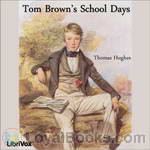 Tom Brown's School Days
Tom Brown's School Days
Tom Brown’s Schooldays is a novel by Thomas Hughes first published in 1857. The story is set at Rugby School, a public school for boys, in the 1830s. Hughes attended Rugby School from 1834 to 1842. The novel was originally published as being “by an Old Boy of Rugby”, and much of it is based on the author’s experiences. Tom Brown is largely based on the author’s brother, George Hughes; and George Arthur, another of the book’s main characters, is based on Arthur Penrhyn Stanley. The fictional Tom’s life also resembles the author’s in that the culminating event of his school career was a cricket match... | |
By: Thomas Jefferson (1743-1826) | |
|---|---|
 Memoir, Correspondence and Miscellanies, Volume I
Memoir, Correspondence and Miscellanies, Volume I
This is the first volume of Thomas Jefferson's public and private writings edited and compiled by his oldest grandson Thomas Jefferson Randolph and published three years after the president's death. There are a total of four volumes in Randolph's set. Summary by Joel Kindrick. | |
By: Thomas Lodge | |
|---|---|
 Rosalynde or, Euphues' Golden Legacie
Rosalynde or, Euphues' Golden Legacie
This novel, which Shakespeare adapted in his pastoral comedy As You Like It, is the archetypal pastoral adventure. Two young persons of high birth, who have recently lost their fathers (one to death, one to banishment), fall in love but are separated almost at once and forced to flee to the Forest of Arden. There they meet again, but as Rosalynde is disguised for safety as a boy, named Ganymede, her lover Rosader does not recognize her. Once Rosader has confided his love to Ganymede, they play a game in which the "boy" poses as Rosalynde to give Rosader practice in wooing... | |
By: Thomas Love Peacock | |
|---|---|
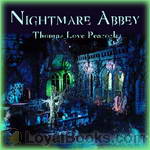 Nightmare Abbey
Nightmare Abbey
Deep in the fens of the British coast sits the gloomy mansion that goes by the name Nightmare Abbey. It is inhabited by persons of very low opinion of the human race, and in fact they pride themselves in the depths of their detestation. Others of its denizens believe the ultimate exercise and product of the human mind ought to be chaos. Now let the young master of the house get snared by the wiles of a beautiful young lady. And for good measure, toss in another beautiful young lady. Now Scythrop... | |
 Headlong Hall
Headlong Hall
Headlong Hall is the first novel by Thomas Love Peacock, published in 1815 (dated 1816). As in his later novel Crotchet Castle, Peacock assembles a group of eccentrics, each with a single monomaniacal obsession, and derives humor and social satire from their various interactions and conversations. The setting is the country estate of Squire Harry Headlong Ap-Rhaiader, Esq. in Wales. | |
By: Thomas Mann (1875-1955) | |
|---|---|
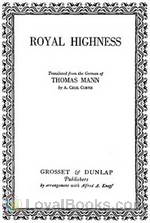 Royal Highness
Royal Highness
Royal Highness is the story of Prince Klaus Heinrich, a member of a struggling German duchy and an exotic American heiress who comes to live as his neighbor. The novel is a microcosm of Europe before World War I, with Mann's depiction of a decaying society that is rejuvenated by modern forces. A true modern day fairy tale. | |
 Death in Venice
Death in Venice
Thomas Mann, author of Death in Venice was a winner of the Nobel Prize for literature. The main character in this novella is Gustav von Aschenbach, a famous author in his early 50s who was widowed at an early age. In poor health, he visits Venice and becomes increasingly obsessed by the sight of a stunningly beautiful lad of 14. This book has been acclaimed a masterpiece and in 1971 was adapted as a film starring Dirk Bogarde. | |
 Buddenbrooks
Buddenbrooks
When Thomas Mann was awarded the Nobel Prize in Literature , the citation made special mention of his first novel, “Buddenbrooks,” published in 1901, describing it as “the first great novel of the 20th century.” Events in the novel center on the Buddenbrook family, bourgeois owners of a wholesale grain enterprise in the northern German city of Lübeck. We follow four generations of Buddenbrooks through the middle decades of the 19th century. The novel is subtitled “The Decline of a Family... | |
By: Thomas Mayne Reid (1818-1883) | |
|---|---|
 Scalp Hunters
Scalp Hunters
"Unroll the world’s map, and look upon the great northern continent of America. Away to the wild west, away toward the setting sun, away beyond many a far meridian, let your eyes wander. Rest them where golden rivers rise among peaks that carry the eternal snow. Rest them there. You are looking upon a land whose features are un-furrowed by human hands, still bearing the marks of the Almighty mould, as upon the morning of creation; a region whose every object wears the impress of God’s image... | |
 Giraffe Hunters
Giraffe Hunters
The Young Yägers, Hans and Hendrik Von Bloom, Groot Willem and Arend Van Wyk, are again on a hunting expedition. This time, the reader will find their old acquaintances in Africa, on the banks of the Limpopo River. Here our young adventurers are looking for sport and wild animals. | |
By: Thomas More (1478-1535) | |
|---|---|
 Utopia (Robinson translation)
Utopia (Robinson translation)
Originally entitled A frutefull pleasaunt, and wittie worke of the beste state of publique weale, & of the newe yle, called Utopia: written in Latine, by ... Syr Thomas More knyght, and translated into Englishe by Raphe Robynson ...The first book tells of the traveller Raphael Hythloday, to whom More is introduced in Antwerp. The second book consists of Hythloday's description of the island and people of Utopia, their customs, laws, religions, economy, language and relations with other nations. Hythloday... | |
By: Thomas W. Hanshew (1857-1914) | |
|---|---|
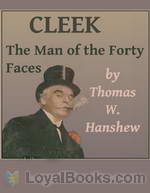 Cleek: The Man of the Forty Faces
Cleek: The Man of the Forty Faces
Meet Hamilton Cleek – man of mystery, and master of disguise and derring-do. Cleek’s exploits are, to say the least, highly improbable, but the book is enormous fun. The goodies are good and the baddies are very bad indeed, but beware – things are not always what they seem. Suspend your disbelief and enjoy a rattling good yarn! Cleek is the central figure in dozens of short stories that began to appear in 1910 and were subsequently collected in a series of books. | |
By: Thornton W. Burgess | |
|---|---|
 Old Mother West Wind
Old Mother West Wind
Thornton Waldo Burgess (January 14, 1874 – June 5, 1965) was a conservationist and author of children’s stories. He loved the beauty of nature and its living creatures so much that he wrote about them for 50 years. By the time he retired, he had written more than 170 books. Many of his outdoor observations in nature were used as plots for his stories. In his first book, “Old Mother West Wind,” published in 1910, the reader meets many of the characters found in later books and stories. These... | |
 Old Granny Fox
Old Granny Fox
Old Granny Fox and grandson Reddy Fox must use all their cunning to hunt up enough food to survive the long winter. Food in the Green Meadow is scarce but Farmer Brown's hens are locked up tight and protected by Bowser the Hound, so Granny takes a conceited Reddy hunting and teaches him some surprising new tricks to lure in their dinner. Old Granny and Reddy Fox encounter danger and adventure in their quests to keep their bellies full, including a close encounter with Farmer Brown's boy, a clever plot to steal Bowser's food, and an unforeseen thief who might outsmart this sneaky pair. | |
 Blacky the Crow
Blacky the Crow
Blacky the Crow is a clever rascal who lives in the Green Forest and Meadow. He loves to play tricks on the other little people who are his neighbours, and is curious about Farmer Brown’s Boy. Blacky is always thinking about what is right and what is wrong, but he still gets into all kinds of mischief. | |
By: Timothy S. Arthur (1809-1885) | |
|---|---|
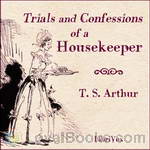 Trials and Confessions of a Housekeeper
Trials and Confessions of a Housekeeper
Is housekeeping such a trial? Mrs. Smith thinks so and confesses all in this merry account of her escapades and near disasters! | |
 Off-hand Sketches
Off-hand Sketches
The reader cannot but smile at some of the phases of life presented in this volume. Yet the smile will, in no case, the author thinks, be at the expense of humanity, good feeling, or virtue. Many of the incidents given, are facts embellished by a few touches of fancy. In all, lessons may be read that some, at least, will do well to lay to heart. | |
By: Tobias Smollett | |
|---|---|
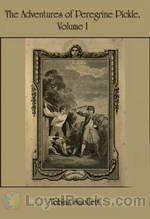 The Adventures of Peregrine Pickle
The Adventures of Peregrine Pickle
The Adventures of Peregrine Pickle is a picaresque novel by the Scottish author Tobias Smollett (1721 – 1771), first published in 1751, and revised and reissued in 1758. It is the story of the fortunes and misfortunes of the egotistical dandy Peregrine Pickle, and it provides a comic and caustic portrayal of 18th century European society. | |
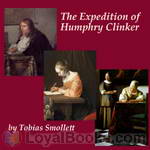 The Expedition of Humphry Clinker
The Expedition of Humphry Clinker
The Expedition of Humphry Clinker was the last of the picaresque novels of Tobias Smollett, and is considered by many to be his best and funniest work. Published in London on 17 June 1771, it is an epistolary novel, presented in the form of letters written by six different characters: Matthew Bramble, a Welsh Squire; his sister Tabitha; their niece and nephew, Jery and Lydia Melford; Tabitha’s maid Winifred Jenkins; and Lydia’s suitor, Wilson. Much of the comedy arises from differences in the descriptions of the same events by different participants... | |
 Adventures of Roderick Random
Adventures of Roderick Random
I am Roderick Random. This is the contemporary story of my struggle against the adversity of orphan-hood, poverty, press gangs, bloody duels, rival fortune hunters, and the challenge to be well-dressed through it all. In the course of recounting my adventures to you, dear reader, I will give you a front row seat to the characters of English eighteenth century life including highway robbers, womanizing monks, debt-laden gallants, lecherous corrupt officials, effeminate sea captains, bloodthirsty surgeons, and my dear friend Miss Williams, a reformed prostitute... | |
By: Tom Godwin (1915-1980) | |
|---|---|
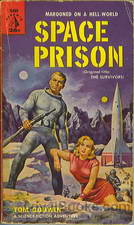 Space Prison
Space Prison
AFTER TWO CENTURIES….The sound came swiftly nearer, rising in pitch and swelling in volume. Then it broke through the clouds, tall and black and beautifully deadly — the Gern battle cruiser, come to seek them out and destroy them. Humbolt dropped inside the stockade, exulting. For two hundred years his people had been waiting for the chance to fight the mighty Gern Empire … with bows and arrows against blasters and bombs! | |
By: Tommaso Campanella (1568-1639) | |
|---|---|
 Sonnets of Michael Angelo Buonarroti and Tommaso Campanella
Sonnets of Michael Angelo Buonarroti and Tommaso Campanella
Michael Angelo and Campanella represent widely sundered, though almost contemporaneous, moments in the evolution of the Italian genius. Michael Angelo was essentially an artist, living in the prime of the Renaissance. Campanella was a philosopher, born when the Counter-Reformation was doing all it could to blight the free thought of the sixteenth century; and when the modern spirit of exact enquiry, in a few philosophical martyrs, was opening a new stage for European science. The one devoted all his mental energies to the realisation of beauty: the other strove to ascertain truth... | |
By: Torquato Tasso (1544-1595) | |
|---|---|
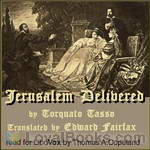 Jerusalem Delivered
Jerusalem Delivered
The First Crusade provides the backdrop for a rich tapestry of political machinations, military conflicts, martial rivalries, and love stories, some of which are complicated by differences in religion. The supernatural plays a major role in the action. Partly on this account, and partly because of the multilayered, intertwined plots, the poem met with considerable contemporary criticism, so Tasso revised it radically and published the revision under a new name, La Gerusalemme Conquistata, or "Jerusalem Conquered," which has remained virtually unread, a warning to authors who pay attention to the critics... | |
By: Toru Dutt (1856-1877) | |
|---|---|
 Ancient Ballads and Legends of Hindustan
Ancient Ballads and Legends of Hindustan
Toru Dutt was an Indian poet, writing in English. Born in 1856, she travelled to England and France, and being a polyglot became fluent in French and English, later in Sanskrit as well. Her works gained popularity and success posthumously. This collection of her poems, Ancient Ballads and Legends of Hindustan, was published by her father after her death in 1877. This collection is divided into 2 parts: the 1st part contains long poems about the ancient legends of her native land of India, which had been passed on to her orally in Sanskrit and which held much fascination for her, and also implied her desire to return to India... | |
By: Trollope, Anthony (1815-1882) | |
|---|---|
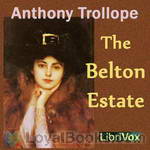 Belton Estate, The
Belton Estate, The
Clara Amedroz is the virtuous, intelligent, and quick-witted heroine of this novel. Like all women of her time, she has few options other than to marry. She is lucky enough to have two eligible suitors, and chooses the more urbane and worldly of the two. Alas, however, she realizes fairly quickly that Captain Aylmer is not a nice person. Throughout much of the novel we find her trying hard not to recognize that Will Belton - the suitor she rejected, and who still loves and wants to marry her - is... | |
By: U. Waldo Cutler | |
|---|---|
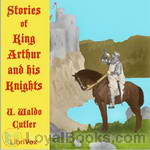 Stories of King Arthur and His Knights
Stories of King Arthur and His Knights
Stories of King Arthur and His Knights. Retold from Malory’s “Morte dArthur”. | |
By: Unknown | |
|---|---|
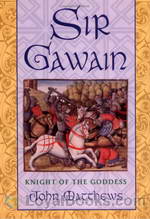 Sir Gawain and the Green Knight
Sir Gawain and the Green Knight
Sir Gawain and the Green Knight is a late 14th Century Middle English alliterative romance outlining an adventure of Sir Gawain, a knight of King Arthur’s Round Table. In the tale, Sir Gawain accepts a challenge from a mysterious warrior who is completely green, from his clothes and hair to his beard and skin. The “Green Knight” offers to allow anyone to strike him with his axe if the challenger will take a return blow in a year and a day. Gawain accepts, and beheads him in one blow, only to have the Green Knight stand up, pick up his head, and remind Gawain to meet him at the appointed time... | |